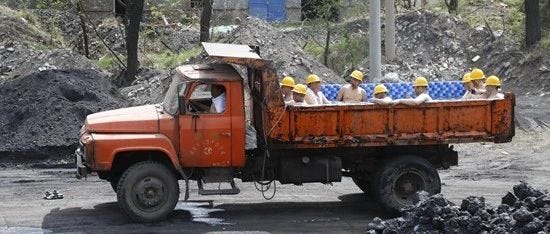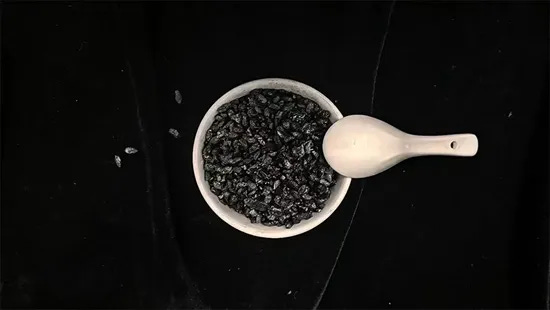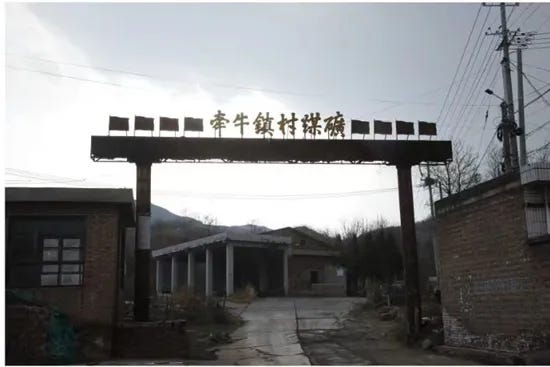Chinese girl transforms father's coal truck into graduation art work
"It is because of this truck that we can afford your college tuition."
In the era when coal propelled China's progress, coal trucks sustained the normal life of countless households. Traversing mountainous terrains in all weather conditions, these vehicles transported coal—often referred to as "black gold"—to remote areas, simultaneously carrying back hopes for prosperity. This year’s Central Academy of Fine Arts graduation exhibition features a piece that transforms an old coal truck into an artistic icon, honoring that period.
The artist's work recounts her father's steadfast efforts and the collective aspirations of ordinary Chinese citizens for a brighter future, symbolizing the next generation's tribute to the hard work and sacrifices of their forebears.
Today's piece is a translation of the story of the artist and her graduation work. The original article, “父亲的运煤车,开到女儿的毕业展 A father's coal truck driven to his daughter's graduation exhibition,” is written by Yin Haiyue and was published on the WeChat blog of the 冰点周刊 "Bingdian Weekly" of China Youth Daily on July 3.
A father's coal truck driven to his daughter's graduation exhibition
Li Qing shot her work The Blue Embraced by Black at an abandoned coal mine in her village in Yangquan, north China's Shanxi Province in April. (Provided by the interviewee)
The old truck was over 20 years old, with peeling paint and a body full of rust. According to national standards, it should have been recycled, dismantled, and destroyed eight years ago.
Li Qing had it shipped to Beijing, decorated it and exhibited it at the Central Academy of Fine Arts (CAFA) as her graduation work. She remembers her father saying, "It is because of this truck that we can afford your college tuition."
The old truck never had a name. It transported coal and water, always dusty, doing as the same tasks as other 30-plus trucks in the same village in Yangquan, north China's Shanxi Province. It sustained the normal life of villagers. However, in May of this year, it finally got a name, The Blue Embraced by Black. The truck bed is tiled with mosaic tiles and filled with water, the water surface reflecting the blue sky, with colorful swimming laps floating in it.
Before her graduation from the School of Experimental and Sci-Tech Arts at the Academy, she wants to pay tribute to her father and expects her parents to be more understanding of what she has been engaged in. She finally completed her work, which also includes some photos and videos, in the abandoned coal mine in her village. A variety of creative materials were used in her work.
"'Black' is coal, and 'blue' signifies a bright future built on 'black'." She noted.
Interpretations and reports about the work can be seen on many social media sites, and many netizens have shared their feelings about the old truck. Some said the truck reminded her of her mother who fed a family of five by selling bittern vegetables with her handcart. Some felt the charm of art from it, "Art is a dream, a memory, and a connection to everything that matters to you."
Li Qing is of the same age with the truck. She remembers that when she was a child, her father, Li Jiantang, transported coal in their hometown village, and every time he came home to wash his face and clothes, the water was dirty. By transporting tons and tons of coal, Li Jiantang bought the family a department in Yangquan. Li Qing went to kindergarten in the downtown area and went back to the village during her summer and winter vacations.
The family of five, including her two sisters, often crowded in the cab of the truck. During Chinese New Year, her father drove the truck to pick up people to pay the New Year’s greeting. The spacious truck bed could hold a dozen or more people. Later, when coal mines ware closed, her father supported Li Qing's college education with income from hauling and delivering water to villages with poor water resources.
"Without this truck, I wouldn't be able to have everything I own today," Li Qing said.
She spent half a year designing this piece, considering multiple concepts, such as piling coal to create an inverted "mine" with projections of coal miners, or exchanging letters with her parents but breaking down each character into strokes to convey the difficulty of communication with loved ones. In the end, she chose her father's old truck.
She climbed into the truck bed and photographed her father driving through the glass behind the cab. The dust accumulated on the glass served as a testament to her father's hard work. Li Qing has also thought of placing coal, old family belongings, and photos in the truck bed, planting crops, or building a ladder to symbolize how her father and the truck have supported her journey to where she is this day.
Eventually, she hammered out a plan with her supervisior. The truck bed was transformed into a swimming pool; several coal miners wearing yellow helmets with faces smeared black soaked in the water and made victory gestures to the camera, revealing their white beer bellies and letting out laughter.
Li Qing said that water resources in her hometown were scarce, and many coal miners, after coming up from the mines, thought about using the limited water to wash their faces, rather than for leisure. "I hope I can do something that allows them to enjoy water, too."
Those black substances mined from the deep within the earth, the coal she is so familiar with, not only sustained her life but also provided her with abundant artistic inspiration.
During her studies at the CAFA, she created a piece titled Please Give Me a Sun, in which she placed coal and plants into an airtight acrylic box. The burning coal generated heat for the plants to grow, and the oxygen produced by the plants' photosynthesis guaranteed the coal's combustion. "It's like the relationship between my father and me, giving to each other."
Li Qing’s art work Make a living by Coal (Provided by the interviewee)
As one of the largest anthracite coal production and processing bases in China, Yangquan is endowed with a natural resource advantage. In the 1960s and 1970s, people from Yangquan transported coal, refractory materials, and pyrite to Shanghai, and returned with fashionable clothes and bicycles, etc. For a time, Yangquan became the most bustling city in the eastern Shanxi region, earning the nicknames "Little Hong Kong" and "Little Shanghai." In the 1980s, township coal mining enterprises also experienced rapid growth.
Qianniuzhen Village, Li Qing's hometown, is located on the outskirts of Yangquan, surrounded by mountains and has a ceramic development history of more than 1,000 years. Li Jiantang originally worked in a ceramics factory, but after it was shut down in 1996, he became a coal transportation worker.
He remembers that over 200 villagers worked in the coal mines at that time. The men dug, sold, and transported coal, while the women handled cost accounting and recharging the mining lamps. After work, people went shopping and dined out, just as what they said, "Every family's life is prosperous."
At that time, Li Jiantang could earn a few thousand yuan a year by transporting coal, which was considered a moderately high income. In 2000, Li Jiantang spent over 20,000 yuan on a second-hand truck. At the same year, his third daughter Li Qing was born.
In Li Qing's memory, the chimney of the coal mine across from her home always emitted smoke. There were many people working in the coal mine, and the village officials would notify villagers with loudspeakers to claim supplies.
Risk came along with affluence. Li Jiantang recalls that when dozens of trucks drove through the village, coal dust flew everywhere and people's mucus was black. After washing clothes and hanging out to dry, a layer of coal dust would coat them following a hust of wind. There used to be a river in the village. After people started dig coal, its water became polluted and undrinkable. Li Qing also remembers his father mentioning that some of his fellow villagers lost their lives in a mining accident.
At the end of 2010, all the small coal mines with an annual production capacity of less than 300,000 tons in Shanxi Province were phased out and closed.
Li Jiantang said that after 2011, when the coal mines were shut down, the air quality of the village improved, but there were also fewer people there. The young went to large cities like Beijing and Shanghai to work as security guards, online car-hailing drivers, and waiters, while the elderly sit in the now-empty village basking in the sun.
While Li Qing had the college education in Beijing, discussed contemporary art with her classmates, and went around to see exhibitions, she felt even more of a "gap." She mentioned, "There is only one exhibition hall in Yangquan, and there are very few young people on the streets".
Li Jiantang gradually aged. Years of driving left him with chronic back pain. The truck was aged, too. The bumpy village roads made it difficult to drive smoothly, people sitting in the truck swaying back and forth. When braking, Li Jiantang had to grit his teeth and pull the handbrake hard, the truck making a piercing sound at the same time.
In the past, Li Qing had filmed her father's work of loading and carrying water. She had ever worried about getting her clothes dirty, but now she is ashamed of her worries, "My father works in this way every day."
Li Jiantang could only earn two to three thousand yuan a month by hauling water. Li Qing recalls that her parents have always been frugal, reluctant to throw anything away, eating leftovers, and only buying new clothes when the old ones were worn out. The massage chair bought by her sister is seldom used by them. Their daily life is a bit monotonous; her mother always stays at home, and her father's only hobby is playing chess. She said, "They are used to living in those hard days, and both their bodies and minds have been stuck in that era."
Despite such hardships, the parents lifted their daughter into the world of art. When still young, Li Qing loved animation and aspired to be a painter, so her mother enrolled her in a drawing course. During the course study, Li Qing heard her teacher say that she could be a painter if she was admitted to the CAFA. Since then, she decided she wanted to pursue the path of an art student.
"To be an art student costs a lot." Li Jiantang was a little hesitant at first but eventually decided to support his daughter's aspiration. "What she wants to do is precious. If my child is happy, I am happy. If the child is not happy, it will be hard for me, too." He said.
To support his daughter's art study, Li Jiantang worked even harder. Li Qing recalled that her father often drove his truck out to haul water at five or six o'clock in the morning and did not return until the evening. However, Li Qing did not pass the CAFA's admission line of the general knowledge portion of her first college entrance examination. She wanted to repeat Grade 3 of senior high school. Though her relatives thought it was too risky, her father supported her. He said, "As long as she puts in the effort, there will be rewards. If it's something she wants to do, it's worth it."
The second time, Li Qing did not disappoint her father. When he learned that his daughter had been admitted to the CAFA, Li Jiantang was delighted, saying, "This is the highest institution for art study."
Li Jiantang took out a loan of more than 30,000 yuan to pay for his daughter's tuition. Knowing the hardship of her parents, Li Qing studied very hard in college. She presented her work at art exhibitions in Shanghai, Beijing, and Mianyang, earning over a dozen honors and awards. She bought her parents two new cell phones and then spent the rest of the money on her graduation project and repaying the loans. In her spare time, she also worked part-time at college, delivering packages on roller skates to earn pocket money.
"The better she is, the more energized we are when working," Li Jiantang's word reveals pride.
However, neither he nor his wife knows about their daughter's major or what experimental art does.
When he heard that his daughter wanted to convert the truck bed into a swimming pool, his first reaction was that it was "nonsense." But, upon hearing his daughter said, "I won't be able to graduate if I don't do this," he compromised.
Although he did not understand the purpose of such a transformation of the truck bed, he could feel that his daughter was doing a great thing.
Li Qing recalls that when she was remodeling the truck bed, a villager stood on the roof, saw the transformation, and asked Li Jiantang, "What is going on here?" He proudly replied, "This truck is going to Beijing!"
Once, her father encountered a village official while driving and excitedly told him, "Look at the truck bed. See the changes." But the official didn't look and instead urged him to dispose of the abandoned truck as soon as possible.
After completing the transformation of the truck bed, Li Qing invited her cousin, who is a miner, and her colleagues to play in the "pool," as a way to "give back." She hopes that her work would do something for her father and her hometown.
An abandoned coal mine in Qianniuzhen Village, Yangquan, Shanxi Province. (Provided by the interviewee)
When photographing those coal workers, Li Qing didn't direct their actions but asked her cousin to capture them at their truest state.
She was particularly struck by the comments after the exhibition. Some people commented on why these coal miners' bodies were so white. "They just thought that miners should be dark and unkempt, and it didn't occur to them at all that they are really whiter compared to other workers because they are not exposed to the sun while working."
Upon reading various comments online, Li Jiantang and his wife begin to "somewhat understand" their daughter's field of study.
At this year's graduation exhibition at the CAFA, there were more than 40 graduation works by students from the School of Experimental and Sci-Tech Arts. Many of the works provoked reflections on self-exploration and family education. But the academy ultimately awarded one of the first prize to the old truck that symbolizes "the past," and another to a piece exploring future artificial intelligence.
The tutor explained to Li Qing, "It resonates with more people and provokes deeper thought. The blue of the mosaic and the yellow of the helmet present a joyful tone that brings strength to people amid a societal torrent." The teacher also encouraged her to develop her own creative language and to show her hometown to a broader audience.
This is what Li Qing has been thinking, "I was born in the countryside, which gives me unique experiences," When the school organized a research trip to a village, a dozen students crammed together sleeping on the floor. There are many bugs and no air conditioning, and many of her classmates couldn't stand it. But she didn't mind. As a child, she often used the maggot-crawling latrine, and also accustomed to the bitter cold in the house when it was tens of degrees below zero, waiting for the coal to burn. She feels that being able to do what she wants to do is more important than fuss over the living conditions.
But she was only in her 20s, and the exhibition of her work meant that her life was exposed to the public.
"I am someone with no background and little financial power," As she spoke, Li Qing thought of her father, and couldn't help but cover her face and cry. Soon, she calmed down. "It was just hard to say out loud, but afterward, I felt okay. After all, I am capable and talented, so it's alright."
After her graduation exhibition, Li Qing took her father's truck to another exhibition in Beijing, and the Aranya Theater Festival in Qinhuangdao also send her an invitation to exhibit.
"I took my father's truck to even farther places," She wrote on her social media.
After being recommended for a master's program without needing an entrance exam, Li Qing chose to focus on rural aesthetic education and social revitalization for her graduate studies. She doesn't yet know much about the career prospects or income potential of this field, but instinctively feels it's the right fit for her.
"Creating art based on the current state of rural areas and giving them artistic value" is her next plan for contributing to her parents and her hometown.






